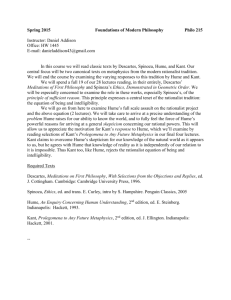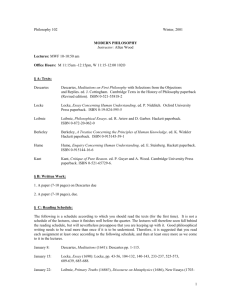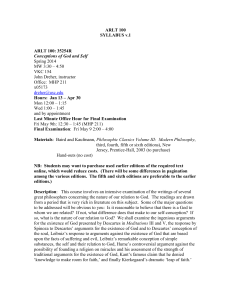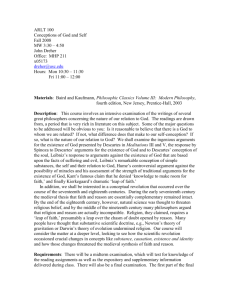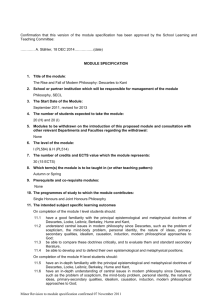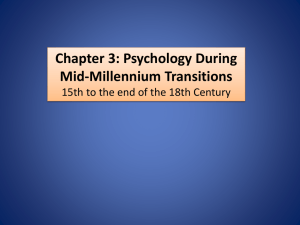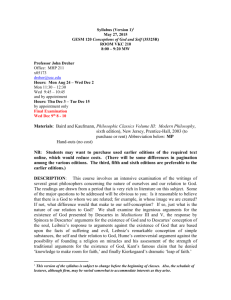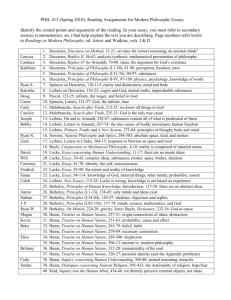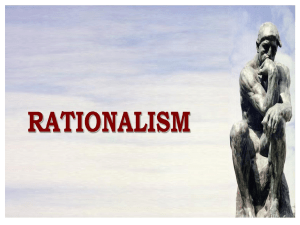Word - University of Southern California
advertisement
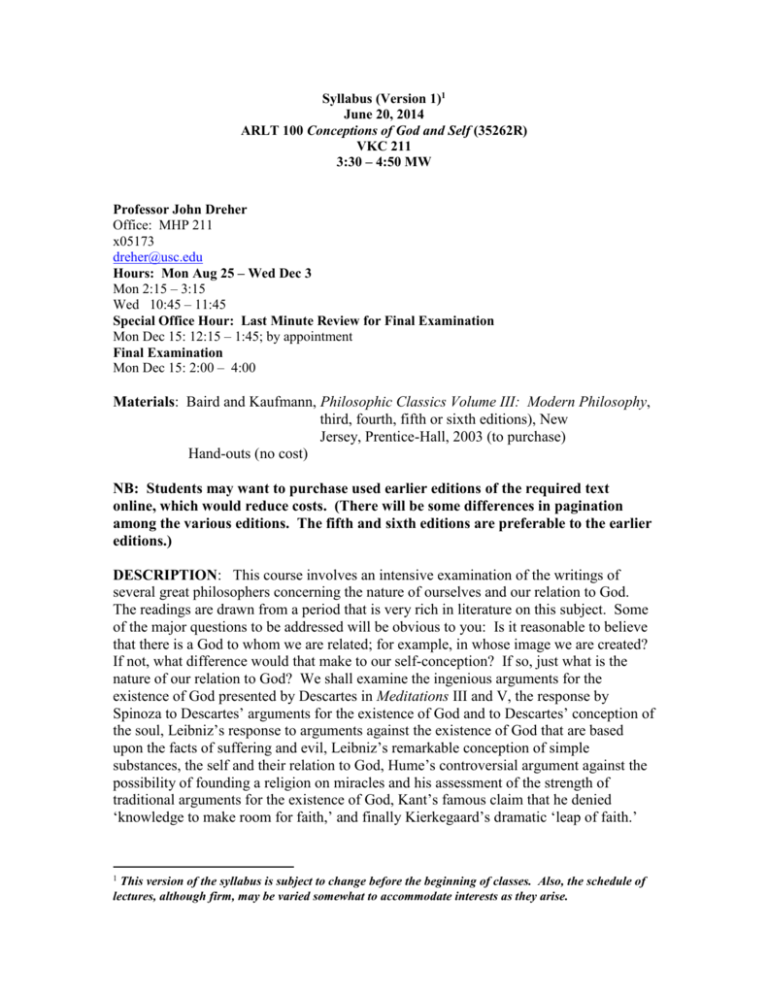
Syllabus (Version 1)1 June 20, 2014 ARLT 100 Conceptions of God and Self (35262R) VKC 211 3:30 – 4:50 MW Professor John Dreher Office: MHP 211 x05173 dreher@usc.edu Hours: Mon Aug 25 – Wed Dec 3 Mon 2:15 – 3:15 Wed 10:45 – 11:45 Special Office Hour: Last Minute Review for Final Examination Mon Dec 15: 12:15 – 1:45; by appointment Final Examination Mon Dec 15: 2:00 – 4:00 Materials: Baird and Kaufmann, Philosophic Classics Volume III: Modern Philosophy, third, fourth, fifth or sixth editions), New Jersey, Prentice-Hall, 2003 (to purchase) Hand-outs (no cost) NB: Students may want to purchase used earlier editions of the required text online, which would reduce costs. (There will be some differences in pagination among the various editions. The fifth and sixth editions are preferable to the earlier editions.) DESCRIPTION: This course involves an intensive examination of the writings of several great philosophers concerning the nature of ourselves and our relation to God. The readings are drawn from a period that is very rich in literature on this subject. Some of the major questions to be addressed will be obvious to you: Is it reasonable to believe that there is a God to whom we are related; for example, in whose image we are created? If not, what difference would that make to our self-conception? If so, just what is the nature of our relation to God? We shall examine the ingenious arguments for the existence of God presented by Descartes in Meditations III and V, the response by Spinoza to Descartes’ arguments for the existence of God and to Descartes’ conception of the soul, Leibniz’s response to arguments against the existence of God that are based upon the facts of suffering and evil, Leibniz’s remarkable conception of simple substances, the self and their relation to God, Hume’s controversial argument against the possibility of founding a religion on miracles and his assessment of the strength of traditional arguments for the existence of God, Kant’s famous claim that he denied ‘knowledge to make room for faith,’ and finally Kierkegaard’s dramatic ‘leap of faith.’ 1 This version of the syllabus is subject to change before the beginning of classes. Also, the schedule of lectures, although firm, may be varied somewhat to accommodate interests as they arise. In addition, we shall be interested in the conceptual revolution that occurred over the course of the seventeenth and eighteenth centuries. During the early seventeenth century the medieval thesis that faith and reason are essentially complementary remained intact. By the end of the eighteenth century, however, natural science was thought to threaten religious belief, and by the middle of the nineteenth century many philosophers argued that religion and reason are actually incompatible. Religion, they claimed, requires a ‘leap of faith,’ presumably a leap over the chasm of doubt opened by reason. Many people have thought that substantive scientific doctrine, e.g., Newton’s theory of gravitation or Darwin’s theory of evolution undermined religion. Our course will consider the matter at a deeper level, looking to see how the scientific revolution occasioned crucial changes in concepts like substance, causation, existence and identity and how those changes threatened the medieval synthesis of faith and reason. REQUIREMENTS: There will be a midterm examination, which will test for knowledge of the reading assignments as well as the expository and supplementary information delivered during class. There will also be a final examination. The first part of the final examination will test for knowledge of the reading assignments as well as expository and supplementary information delivered during class sessions following the midterm examination. The second part of the final examination will be a comprehensive question dealing with the main theme of the course. The comprehensive question will be discussed towards the end of the semester. Class attendance is very strongly recommended. Please schedule at least one meeting with me during the course of the semester to discuss your work. There will be three short papers, approximately five pages in length. Recommended topics are: Paper #1: What is the philosophical problem known as the ‘Cartesian circle’? What is Descartes’ proposed solution to it? Paper #2: Compare Descartes’ and Spinoza’s conceptions of substance. Do they mean the same thing by ‘cause,’ by ‘existence,’ by ‘identity’? How do their differing conceptions of substance affect their views of God and of the self? Paper #3: How does Leibniz attempt to show that the existence of God is compatible with the existence of suffering and evil? Be sure to discuss all eight of the objections and replies in the (abridgment) of the Theodicy. You may substitute a paper topic of your choice for the recommended topic with advance permission. Below are a few alternatives that may be of interest: ALT Paper #1: What is Pascal’s wager? To whom do you think Pascal’s wager is addressed? What does the wager presuppose about the possibility of knowledge? 2 ALT Paper #2: How does Spinoza attempt to deal with the apparent difficulty that Cartesian philosophy faces in explaining how it is possible for mental and material substances to interact? ALT Paper #3: What does Leibniz mean by the ‘pre-established harmony’? How does Leibniz rely upon it in reconciling his views about physical science with his famous monadology? Grades will be calculated as follows: Paper #1 – 1/6 Paper #2 – 1/6 Paper #3 – 1/6 Midterm Exam – 1/6 Final Exam: Part I – 1/6 Final Exam: Part II – 1/6 What Do Grades Mean? In general, a grade of ’85,’ which is a ‘B’ on the grading scale above, indicates a solid knowledge of the material covered on the hand-outs and a familiarity with the most important passages drawn from primary texts. Higher grades of ‘B+,’ ‘A-‘ and ‘A’ indicate knowledge that goes beyond the basics. In order of importance, those indicators are: 1. demonstrated capacity to analyze the logical structures of arguments, viz., to identify their premises and conclusions and to determine their strengths and weaknesses; 2. demonstrated knowledge of primary texts by apt and accurate reference to them; 3. apt comparisons of primary texts to those of other philosophers; Lecture Notes: Lecture notes for each class will be distributed by e-mail and posted on Blackboard, ideally before each class. The lecture notes are meant to summarize the essentials of each lecture in a relatively non-technical, easily accessible form. They are not a substitute for class attendance. Late Submissions and Missing Work: Work submitted within 48 hours after the due date and time will be penalized by 1/3 letter grade. Work submitted more than 48 hours but less than one week after the due date will be penalized by 2/3 of a letter grade. Work submitted later than one week after the due date but before the final examination will be penalized by one full letter grade. Work will not be accepted without an excuse after the final examination. Unexcused missing work after the final examination will be penalized as follows: For any examination or required paper, the final course grade will be lowered by one full grade. For example, suppose that only three of four, equally weighted, required pieces of work were submitted on time and received grades of 90, 85 and 93. The average of the three would be: 89.33, which is a ‘B+.’ The course grade would be reduced by one full letter grade to ‘C+.’ Integrity and Timeliness: 3 Please remember that the University strictly prohibits plagiarism, which can be the mere failure to acknowledge the work of another as well as the deliberate misrepresentation of the work of another as your own. You must acknowledge your indebtedness not only to the ideas of others but also to their words. In general, excuses for late papers or missed examinations will be accepted only in extraordinary circumstances, including illness, genuine family emergency or unavoidable absence for an approved University of Southern California activity. Please remember that it is impossible accommodate a special request by a single individual unless the same opportunity is extended to everyone in the class. This makes it virtually impossible to allow extensions of due dates for reasons other than those indicated above. SCHEDULE OF READINGS, ASSIGNMENTS AND EXAMINATIONS: 1. Mon Aug 25: Introduction: Background of 17th and 18th century philosophy: influence of the scientific revolution on epistemology, the rise of naturalism; decline of religious authority; skepticism about perception about perception; Descartes’ goal in the Meditations; distinguishing first personal from third personal readings: Dedicatory letter, Preface, Synopsis of the Meditations, MP 9 – 19. Discourse on Method (hand-out) 2. Wed Aug 27: Descartes, Meditation I: ‘Demons, Dreamers and Madmen’: The three stages of doubt: Ordinary illusions and hallucinations. Could it be that all perceptions are non-veridical, and life is but a dream? Systematic doubt and the point of the Evil Demon Hypothesis. MP 19 – 22. 3. Mon Sep 1: M.L. King, Jr. Day: UNIVERSITY HOLIDAY 4. Wed Sep 3: Descartes: Meditation II: Essence and existence: ‘The Cogito’: Selfdiscovery and self-knowledge; self-validation and metaphysical presuppositions: The Imprint Theory of Causation; ex nihilo, nihilo fit. That seeing is not (reasonable) believing. The role of reason in perceptual knowledge; the wax example; hats and cloaks; that knowledge of matter is secondary; knowledge of the self is primary. MP 22 – 27. 5. Mon Sep 8: Descartes: Meditation III: Argument for the existence of God from the fact of our idea of him; ‘clear and distinct perception’ that God is simple, eternal and ‘self-caused;’ that the existence of God cannot be demonstrated from His nature without first establishing the Truth Principle, which is that everything we clearly and distinctly perceived is true. That Descartes successfully argues that we can clearly and distinctly perceive that whatever we clear and distinctly perceive is true. The Circle: The objection to Descartes that he cannot claim to show that everything clearly and distinctly perceived is true (that is, the Truth Principle) without first establishing the Truth Principle itself, which is a ‘viciously circular’ undertaking. Descartes’ probable response: that his critics overstate his promises and ambitions (cf. Mediations and Discourse), which are only to satisfy himself that he clearly and distinctly perceives that God exist. MP 27 – 35. 4 6. Wed Sep 10: Descartes: Meditation IV: Error as intellectual sin: Having demonstrated the existence of God to his own satisfaction, Descartes finds himself with a surprising turn of events. Before satisfying himself of the existence of God, he wondered how he could reasonably believe that he was not constantly deceived, but after satisfying himself of the existence of God, he wonders why it is that God allows him ever to err. Descartes compares choosing to act with affirming belief. Just as we are free to choose good rather than evil, we are free to engage in sloppy rather than rigorous belief formation. When we allow our imagination to run past the boundaries of our understanding, we are vulnerable to error. MP 35 – 40. 7. Mon Sep 15: Descartes, Meditation V: The nature of material things: Cartesian mechanism; Boyle and Descartes: Intelligible forms in Cartesian metaphysics? The certainty of mathematics; the distinction between systematic doubt and reason-specific doubt; the Cartesian conception of demonstration and Port Royal logic; validation of the ontological argument: MP 40 – 44. 8. Wed Sep 17: Descartes: Meditation VI and Correspondence of Princess Elizabeth Self-knowledge and knowledge of the ‘external world’: Can ‘probable knowledge’ be clear and distinct? Connections between the mind and the ‘exterior’ world: the role of the pineal gland. Objections by Princess Elizabeth and Spinoza to Descartes’ theory of perception: MP 44 - 57. 9. Mon Sep 22: Pascal: Pensees: Asymmetries between the logic of belief and the logic of action; early seventeenth conceptions of probability (cf. Descartes, Meditation VI). The wager: That a life based upon the belief God is more reasonable than any alternative due to the value of the payoff; objections arising from competing conceptions of God; objections based upon complaints about the conception of infinity. To whom was the wager addressed? MP 103 – 111. 10. Wed Sep 24: Spinoza: Ethics I: Definitions and axioms: Spinoza’s conception of substance; rejection of Descartes and Aristotle on finite substances; accidents and modes; the infinite modes of substance; finite modes of substance conceived under the attributes of thought and of extension; embracing of the Imprint theory of Causation; Spinoza on knowledge; Spinoza’s proof of the existence of God; Spinoza’s hard determinism and attenuated notion of free choice and action. Spinoza against anthropomorphic conceptions of God. MP 114 – 120. 11. Mon Sep 29: Spinoza: Ethics II: Spinoza’s parallelism; comparison with Descartes; That the order and connection of ideas is the same as the order and connection of things. The illusion of time. The relation between the mind (a conscious, thinking thing) to its ideas; that the mind is the idea of the body, comparison with conceptions drawn from contemporary information technology. The distinction between true and adequate ideas MP 120 – 141 12. Wed Oct 1: Spinoza: Ethics III – V That all living entities exhibit conatus or the tendency to persevere in their own existence; that joy is the consciousness of an increase 5 in one’s own power; that is, in the capacity to successfully persevere in one’s own existence; that sorrow is the contrary of joy. The good for human beings is what they know certainly is useful to them, and what is useful to them is whatever increases their power. Despite Spinoza’s egoism, he favors an ethic that is functionally equivalent to other-regarding ethics because he believes that integrating oneself successfully in society is essential to increments in one’s own power. Spinoza claims that the good life involves the contemplation of reality (viz. God) sub specie aeternitatis, which increases in direct proportion to the formation of adequate ideas; the contemplation of reality via adequate ideas is the intellectual love of God. (You may rely entirely upon the lecture notes for this session.) Paper #1 DUE Wed Oct 1 at 3:30 p.m. 13. Mon Oct 6: Review for Midterm Examination 14. Wed Oct 8: Midterm Examination 15. Mon Oct 13: Why, according to Leibniz, simple substance cannot be material. A conception of simple spiritual substances as ‘intelligibilia;’ that substances cannot enter into causal relations; that material things are composites that are ultimately composed of simple spiritual substances; an analogy between Leibniz’s view and contemporary string theory; the identity of indiscernibles and the indiscernibility of identicals; Leibniz’s argument against absolute Newtonian space; the law of non-contradiction and the law of sufficient reason; Leibniz’s definition of possible worlds; the relation of compossibility. Monadology 1 – 17: MP 290. 16. Wed Oct 15: The distinction in Leibniz between souls and spirits; against the Cartesian mechanistic treatment of animals: The general distinction between final and efficient causes in Leibniz; final causes and entelechies; that God’s final and efficient causes are identical; two realms in which final causes operate: the cosmos and the soul; The pre-established harmony of final and efficient causes. Monadology #18 – 90: MP 291 - 298. 17. Mon Oct 20: The philosophical methodology of seventeenth century philosophy: Syllogistic logic and the truth functional logic of the ancient Stoic, Chrysippus; conditional syllogisms. Use of conditional syllogisms by Leibniz in the Theodicy. Contrast between the relatively simple-minded logic of the period with the extraordinary mathematics of the period. Leibniz’s sophisticated philosophy of mathematics; numbers as potentialities, denial of real infinitesimals and infinities; the method of differentials contrasted with Newton’s dynamical presentation of the ‘fluxion’; a Leibnizian conception of zero. (hand-out) 18. Wed Oct 22: Leibniz: Theodicy: Objections I, II, III, IV: The basic argument against the existence of God as a consequence of evil; Leibniz’s rejection of the basic argument on the grounds that although God chose the best possible world, as is consistent 6 with His nature; that the best possible world need not be free of either natural or moral evil; that the good in intelligible creatures surpasses in quality the evil, which may be greater in quantity; that natural goods (qualities beneficial to human beings) of nonintelligent creatures make up for natural and even moral evil; that God is not responsible for punishing those who freely choose evil even though God has foreknowledge of their evil choices; that the will is not necessitated by what inclines it to evil. MP 281 – 287. Paper #2 DUE Wed Oct 22 at 3:30 p.m. 19. Mon Oct 27: Leibniz: Theodicy: Objections V, VI, VII, VIII: Privation and the source of sin and error: that God is not responsible for the actions of those who freely choose evil even though God foresees all events; the distinction between the antecedent and consequent will; the lazy sophism and justification for moral weakness. Finally, it may be objected that because God must choose the best of all possible worlds, he does not choose is freely, but Leibniz argues that this misses the point that God chooses in accordance with His nature, which is the definition of free choice. MP 287 – 289. 20. Wed Oct 29: Hume: The distinction between ideas and impressions; that all ideas come from experience (concept empiricism); the principles of association of ideas; the distinction between natural and philosophical relations of ideas; that causation alone is both a natural and philosophical relation; Hume’s rejection of the Imprint Theory of Causation,’ and skeptical doubts that arise concerning associative theories of causation; Hume’s attempt to relieve those skeptical doubts; the idea of necessity in empiricist philosophy. ECHU Sections I, II, III, IV, V: MP 352 – 380. 21. Mon Nov 3: Hume: Treatise of Human Nature, ‘Of the Immateriality of the Soul’: The take-away argument. Does the take-away argument apply to physical ‘substances’? Hume’s skepticism concerning the senses; skepticism concerning reason; the distinction between Pyrrhonian (named after Pyrrho of Elis) and academic skepticism in Hume Hume’s failure to sustain a theory of personal identity based upon the model of a republic. Hume’s lament in the Appendix to Part One of the Treatise of Human Nature: An inconsistent triad. (hand-out) 22. Wed Nov 5: Hume: Against miracles, Hume’s argument that no religion can be (reasonably) founded on a miracle; the distinction between public reason and private revelation or vision; Hume’s argument that it is always more reasonable to interpret a surprising event as a natural rather than a supernatural event; eighteenth century probability theory, and the case of Teresa of Avila; Hume’s anticipation of Bayes; the distinction between prior probabililty and epistemological weight. ECHU, X, XI, MP 404 – 423 and hand-out 7 23. Mon Nov 10. Hume: Against the three traditional arguments for the existence of God: The teleological (argument from design), the cosmological and ontological arguments; that arguments for the existence of God from purported natural purposes are based upon data that severely underdetermine theory; that the argument for a prime mover demands an explanation where there is no reason to expect an explanation; that the ontological argument is based upon the mistake of thinking that matters of existence can be necessary when the ‘contrary’ of every existence claim is possible. DCNR, Parts IX – XII, MP 463 – 471. 24. Wed Nov 12: Kant’s Critical Philosophy: Kant’s distinction between the analytic and synthetic; between the a priori and the a posteriori. Ways in which Kant’s distinctions challenge Hume; Kant’s distinction between pure intuitions and pure concepts; Kant’s theory of space and time; why it is that Euclidean geometry and arithmetic are synthetic a priori. The challenges of Gauss and Einstein to Kant; Kant’s conception of critical philosophy: To explain how knowledge is possible assuming that Newtonian physics is knowledge. Preface to the Critique of Pure Reason, second edition, MP 513 – 520. Paper #3 DUE Wed Nov 12 at 3:30 p.m. 25. Mon Nov 17: Kant: On the Pure Categories of the Understanding; relation to the Table of Judgments and its connection to syllogistic logic; the schematism of the categories, in particular causation; resolution of Hume’s skeptical doubts about causation; Kant’s discussion of intensive and extensive magnitudes (cf. Boyle). The synthetic unity of apperception; the transcendental unity of apperception and Kant’s implied criticism of Leibniz: MP pp. 520 – 589; hand-out (Suggested reading only; you may rely entirely upon the lecture notes for this session.) 26. Wed Nov 19: Kant: The determination of the bounds of pure reason, the distinction between the noumenal and phenomenal ‘realms,’ the empirical self; the notion of spiritual substance; antinomies of pure reason relating to the infinity of space and time and to freedom; Kant’s arguments against the possibility of proving the existence of God. Prolegomena to Any Future Metaphysics, MP, pp 584 – 93 27. Mon Nov 24: Kant: The Categorical Imperative; the moral foundation of religious faith; apprehension of the moral law; explanation and the phenomenal and noumenal realms; comparison with Leibniz (hand-out from the Groundwork of the Metaphysics of Morals) 28. Wed Nov 26: Thanksgiving Eve: UNIVERSITY HOLIDAY 29. Mon Dec 1 Epilogue: Hegel, The beautiful soul; internalization of the noumenal realm; the ego (self) as a cultural object; Kierkegaard’s rejection of Hegel; the leap of faith; the self as an act of continual becoming; anticipations of Nietzsche and Sartre. (hand-out from Daniel Shannon, ed., University of Toronto Hegel Translation Group: 8 Hegel: Chapter Six, Phenomenology of Spirit) (Suggested reading only; you may rely entirely upon the lecture notes for this class.) 30. Wed Dec 3: Review for Final Examination/Class Evaluation STUDY QUESTIONS: THE BASICS The questions below are designed to help you focus on the basics, on the more important parts of the readings and lectures. There may be additions to the list of the study questions during the semester and the questions themselves may be modified. DESCARTES D1. What are the three stages of doubt identified by Descartes in Meditation I? How are they related to each other? What is the purpose of the doubt? Does the fact that a proposition is doubted show that Descartes has a reason for doubting it? (Check Meditation V in addition to Meditation I before answering this question.) D2. Apparently Descartes is satisfied that he is a thinking thing because he has concluded that he exists on the grounds that he thinks. Discuss the significance of this inference for Descartes’ argument for the existence of God in Meditation III and for Descartes’ conception of the relation of mind and body developed in Meditation II. D3. Reconstruct Descartes’ proof of the existence of God found in Mediation III. Be sure to discuss his famous principle about the formal reality and the objective reality of ideas. D4. According to Descartes, error arises when our will extends beyond the scope of our understanding, and when we affirm on the basis of imagination rather than genuine understanding. Yet, why does Descartes insist that error cannot originate in the understanding? D5. Reconstruct Descartes’ argument for the existence of God found in Meditation V. Be sure to include a discussion of the significance of the fact that God is eternal in elaborating the proof. D6. According to Descartes, the doubts that he entertained in Meditation I are not fully warranted once we have come to see that God exists and that he is not a deceiver. Specifically, how does the existence of God relieve Cartesian doubt? PASCAL P1. To whom does Pascal add his famous wager? What is the structure of the wager? Should the people to whom it is addressed be convinced by the wager argument? SPINOZA 9 S1. In Spinoza’s philosophy, how are the concepts of substance, attribute and modes related to each other? Why does Spinoza think that there is at most one substance? S2. What is Spinoza’s distinction between something that is absolutely infinite and something that is infinite in its own kind? Between something that is finite and something that is infinite? What are the relations between finite extended modes and ideas? S3. What are the two ways in which we conceive substance? Are there more than two ways in which substance can be modified? What are the infinite modes of substance? How are the infinite modes related to the finite modes? Do temporal relations extend to infinite modes as well as finite modes? S4. What is Spinoza’s argument for casual determinism? What role does the concept of a ‘transitive cause’ play in the argument? Is there any sense in which we are free? Is there any sense in which God is free? LEIBNIZ L1. What is Leibniz’s argument for his claim that ‘the world’ consists of simple, spiritual substances? How does Leibniz reconcile the existence of matter with his view that the ultimate constituents of reality are monads? According to Leibniz, what is physics about, and what do physical laws describe? L2. What according to Leibniz is a perception? What sorts of entities have perceptions? How does Leibniz distinguish perceptions from apperceptions? What sorts of entities have apperceptions? What is the role of appetition in Leibniz’s account of choice? L3. Leibniz claims that each monad ‘mirrors’ the universe. How is this claim related to the theory that for Leibniz all relational properties are conceived as intrinsic properties? What does Leibniz mean by the ‘pre-established harmony’? Specificially, what does the pre-established harmony harmonize? What in Leibnizian metaphysics is a human being? L4. According to Leibniz, some influences upon us incline us without necessitating? What philosophical problem is addressed by this distinction? How, according to Leibniz, is it possible for us to choose freely if all our actions are pre-ordained and foreseen by God? HUME H1. What is Hume’s argument against the existence of substance? How does his argument affect our conception of ourselves, of God? What are Hume’s criticism(s) of the conceptions of substance found in the works of Descartes? of Leibniz? of Spinoza? 10 H2. What is Hume’s distinction between matters of fact and relations of ideas? Are causal statements matters of fact or relations of ideas? Why? What is Hume’s understanding of causation and how does it differ from the view of causation found in rationalist philosophers like Descartes? What difficulties are raised by Hume’s account of causation for his theory of personal identity? H3. What is the essence of Hume’s objection to the claim that the existence of miracles can be the foundation of a religion? Be sure to begin you answer by explaining what Hume means by ‘a miracle.’ Hume allows, in his example concerning the Indian prince, that an event may be quite extraordinary, beyond anything in the experience of an individual, and yet still NOT be a miracle. How does Hume distinguish between those extraordinary events and miracles? H4. How does Hume attempt to counter arguments for the existence of God in the Dialogues Concerning Natural Religion? Be specific: How does Hume deal with the argument from design, the cosmological argument and the ontological argument? KANT K1. What, according to Kant, are synthetic a priori judgments? How are synthetic a priori judgments related to the pure forms of intuition and the pure concepts of the understanding? How does Kant attempt to justify his claim that every event has a cause? K2. How does Kant deal with the notion of substance? Is substance a concept in Kant’s sense of ‘concept’? Is substance an object of possible experience? Why does this matter to Kant? What are the consequences of Kant’s views about substance for his conception of the self? for his conception of God? K3. Kant claims that he ‘has found it necessary to deny knowledge, in order to make room for faith.’ (Critique of Pure Reason, Preface to the Second Edition, MP p. 513) What is it that Kant believes that we cannot know? What are the objects of faith? How, according to Kant, is it possible for us to think of objects of faith, specifically, of God? K4. Kant believes in the determinism of nature and in the free (autonomous) will. How does he attempt to reconcile these two apparently conflicting claims? What are the consequences of his dualism with respect to the self for his views about morality and religion? HEGEL H1. How, for Hegel, does the rise of Newtonian science threaten the very conception of the sacred and holy? What is the consequence of the atheism and deism for transcendent moral values? For Hegel, is the ethical possible without the holy? What irony does Hegel see in the attempt to live a holy life in the post-Enlightenment era? How is that irony relevant to Hegel’s conception of the ‘beautiful soul’? 11 KIERKEGAARD KK1. How does Kierkegaard’s philosophy of religion re-conceive Kant’s understanding of the noumenal realm, specifically with respect to the self or ego? Contrast Hegel’s account of the ego with Kierkegaard’s notion of the continually renewing self. COMPREHENSIVE C1. Discuss the role that changing conceptions of substance and causation play in undermining rationalist views of God and the self, and explain how they facilitate the skeptical views of Hume and the critical views of Kant. (Include as much detail and as many references to the text as you can in the limited time that you have to write.) C2. Contrast Hume’s distinction between relations of ideas and matters of fact with Kant’s distinctions between analytic and synthetic judgments and between a priori and a posteriori judgments. What are the consequences of their disagreements about these distinctions for their views about causation? about mathematics? about our knowledge of the phenomenal world? C3. What distinguishes the Enlightenment as a world-view from the world-view of the early modern rationalists? Specifically, how do the two world-views differ with respect to their theories of knowledge and belief? What are the consequences of those differences for our understanding of God and of ourselves? 12
